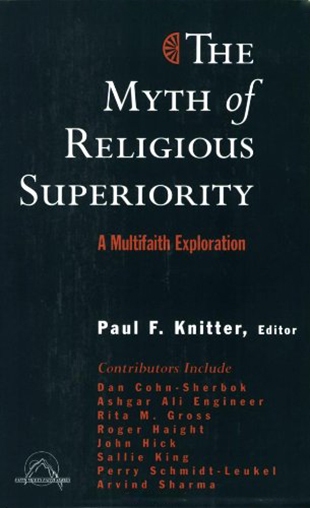"In India the problem of interreligious relations has engaged the attention of thinking persons for over three thousand years. In his own day Gandhi was confronted with strained relations between Hindus and Muslims. Hatred and suspicion had poisoned the atmosphere. Bloody religious riots were frequent. The growing tension between the two communities distressed Gandhi a great deal. He deplored these riots and believed that both Hindus and Muslims could and should live and work together for the common good. He pleaded and prayed and fasted for religious harmony. In fact, during the last decades of his life his major preoccupation was harmony between Hindus and Muslims.
"Gandhi was a Hindu who advocated the rights of the Muslims. He pleaded with the Hindu majority to treat the minority with justice and fairness. He went from place to place, meeting Hindus and Muslims and proclaiming the fatherhood of God and the brotherhood/sisterhood of all peoples. He said to the people: 'God is one. Allah and Rama are his names.' In the midst of pervasive darkness, Gandhi served as a beacon of light. He sought to heal the wounds that people, in their religious frenzy, were inflicting upon themselves. He worked miracles. Lord Mountbatten, the last viceroy of India, described the situation in this way: 'While the 55,OOO-man boundary force in the Punjab was swamped by riots, the one-man boundary force brought peace to Bengal.' A fanatic Hindu, however, believing that Gandhi was disloyal to Hinduism, assassinated him. Even in his death he achieved something remarkable; his martyrdom shamed his people out of the hysteria of hatred and fratricide and helped the country consolidate its constructive and democratic forces.
"Gandhi wanted harmony and friendship to be established not merely between the Hindus and Muslims of India, but among the adherents of all the great religions of the world. 'Hindu-Muslim unity means not only unity between Hindus and Muslims but between all those who believe India to be their home no matter to what faith they belong.' The problem of the mutual relationship of religions is worldwide today. What is going on in Ireland, the Middle East, Cyprus, the Indian subcontinent, and elsewhere in the name of religion is most distressing and depressing. The exaltation of terrorism in the name of religion is tragic. In the words of Gandhi, 'To revile another's religion, to make reckless statements, utter untruth, to break the heads of innocent men, to desecrate temples or mosques is a denial of God.'
"Gandhi's interreligious dialogue authentically represents the Indian attitude of respect for all religions. The idea that 'truth is one: sages call it by different names' has been alive in Hinduism since the time of the Rgveda. Because of his great concern for truth, Gandhi was inwardly receptive to the currents of truth coming from other religions. To ignore any of them meant to ignore God's infinite richness and to impoverish humanity spiritually. Gandhi wanted all religions to revive their pristine past and develop their traditions. 'I ask no Hindu or Mussalman to surrender an iota of his religious principle. Only let him be sure that it is religion. But I do ask of every Hindu and Mussalman not to fight for an earthly gain.'
"Although Gandhi insisted that each religion must hold firm to its principles and distinctive differences, he was clear that no religion can hold up these principles and differences as superior to all others. In questioning absolute truth-claims, he resonates with a core content of the pluralist model. Here religious believers, or especially religious leaders, can learn from the scientists. The sciences, which study the natural world, do not claim 'any monopoly of wisdom for their own particular branch of study nor quarrel about the superiority of one science over the others.' In a similar way, Gandhi held that each religion must bring its individual contribution to humanity's understanding of the spiritual world and not quarrel about the superiority of one religion over another, for God's love embraces the whole world. He believed that all the world religions are God-given and that they serve the people to whom they are revealed. They are allies engaged in the common cause of the moral and spiritual uplift of humanity. In the context of the emerging world community, all the great religions are useful, necessary, and complementary to one another as revealing different facets of the one truth.
"The problems that threaten the world community are not merely political or economic; they arise as well from certain basic religious and spiritual attitudes. If the faith and integrity of other persons are not respected, genuine communication and consequent world community will be at best a dream."
